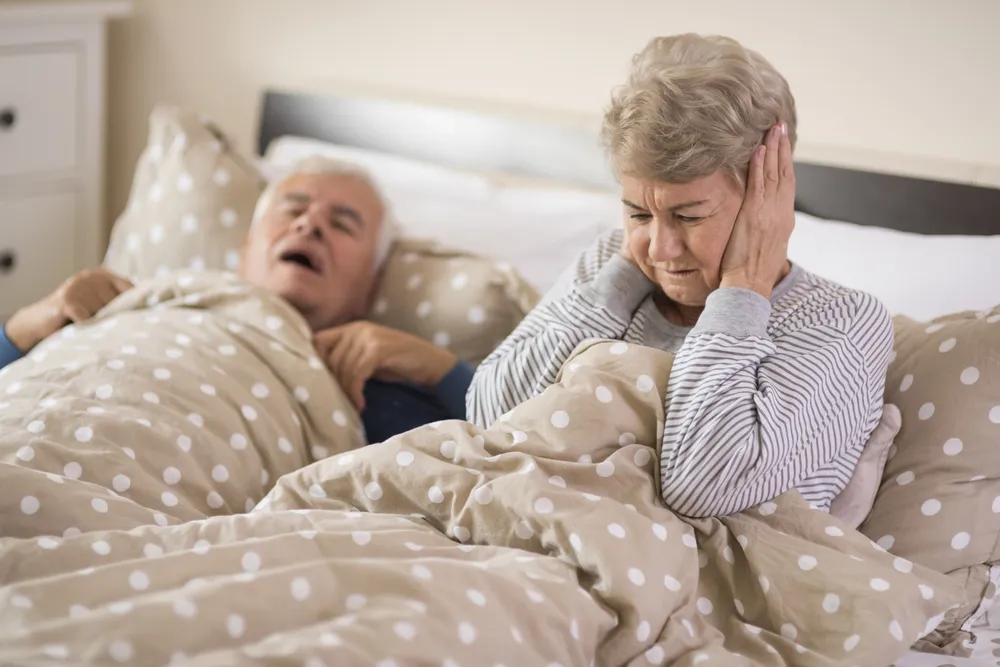Snoring is a frustrating condition – whether you’re suffering its effects as a sleeper or a listener, no one enjoys snoring. And snoring can ruin your sleep each night, keeping you and others awake as you struggle to breathe. If you’re struggling with snoring while you sleep, check out top snoring solutions that are great for seniors.
Nasal Strips
Nasal strips are one of the easiest snoring solutions you can try. Worn only at night, these strips can work to open your airways and soothe the sounds – and symptoms – of snoring.
Nasal strips are sometimes called nasal dilators, as they work to keep your airway open and allow air to pass in and out more easily. There are two different types of nasal strips:
- Strips worn over the bridge of the nose that open the nostrils and nasal passage
- Strips that are placed inside the nostrils and work to dilate the nostrils and nasal passage
No matter which style of nasal strips you choose, these dilators work by keeping your nostrils and the sides of your nose open while worn. Simply propping your nasal airways open can result in reduced snoring.
And, according to Very Well Health, these simple strips can be quite effective: a recent research study found that nasal strips worn on the nose reduced the intensity of wearers’ snoring. The important fact to remember is that nasal strips are best for – and most effective in – those who don’t have a health condition affecting their sleep.
Anti-Snoring Mouthpieces
While it seems like snoring happens in the nose, the mouth actually plays a pretty big role too – and for many people, it can be exactly where snoring starts. Fortunately, anti-snoring mouthpieces can keep the factors that cause snoring under control.
Anti-snoring mouthpieces, like ZQuiet, work by adjusting your lower jaw. By moving your jaw by just a few millimeters, these mouthpieces prevent your tongue from blocking your airway, making it easier to breathe in and out.
As SnoreLab explains, these anti-snoring mouthpieces can be highly effective: 70 percent of those who tried ZQuiet found their snoring was significantly reduced, and more than half of those people reported that they stopped snoring altogether.
CPAP Machines
Sometimes, the cause of snoring is something much deeper than your pillow placement or your mouth’s position while asleep. And if that’s the case for you, you may need a more permanent, long-term solution to your snoring woes, like a CPAP machine.
CPAP machines are designed for those who struggle to breathe while asleep – specifically, they’re for those who have sleep apnea. Those with sleep apnea can suddenly stop breathing while they sleep, putting their health in danger. A CPAP machine increases the air pressure in your throat while you’re asleep, which in turn prevents your airway from collapsing. This ensures you don’t stop breathing, and it also decreases any snoring.
In order to get a CPAP machine, you’ll need to get a diagnosis from your doctor and know that this is the right snoring solution for your health. Each night, you’ll wear a mask that covers your nose and mouth as the CPAP machine runs.
CPAP machines are highly effective: according to the National Sleep Foundation, it’s the most effective treatment for sleep apnea that doesn’t involve surgery, and it can bring better sleep as well as a host of all-over health benefits for serious snorers.
Adjusting Sleeping Habits
Sometimes, the simplest solution for snoring is already right in front of you. And whether you’re snoring infrequently or every night, you may simply need an adjustment in your sleeping habits and behaviors.
Snoring can be caused by factors as small as your sleeping position. In certain positions, like sleeping on your back, your tongue and soft palate can collapse and block your airway, creating a snoring issue. However, if you sleep on your side, you can prevent this entirely. Try sleeping next to a body pillow, which can prompt you to stay on your side all night long and can stop future snoring.
You can also try elevating the head of your bed while sleeping. If you have an adjustable bed or extra pillows, propping your head up slightly may do the trick and prevent your tongue from blocking your airway.
What you drink before bed can also make a difference. If you’re dehydrated, WebMD notes that you can have stickier nose and mouth secretions, which can lead to more snoring. Try to get your daily recommended dose of water: 11 cups for women and 16 cups for men. Additionally, avoid alcohol before heading to bed – it can relax the throat muscles and cause snoring.
Anti-Snoring (Wedge) Pillows
As mentioned above, your sleeping position can cause you to snore. And if you’re a back sleeper who can’t stop snoring, consider trying a special anti-snoring pillow to soothe your noisy nights.
Also called wedge pillows, anti-snoring pillows are designed to keep those who prefer sleeping on their back on their sides – and these uniquely shaped pillows are meant to correct your posture while you sleep to prevent snoring altogether. Wedge pillows support the upper body, neck, and head so you’re comfortable while sleeping, and the angle position keeps your tongue and soft palate in place, which in turn keeps your airways open.
Sleeping on an anti-snoring or wedge pillow can also prevent any sinus pressure or buildup while you sleep, which can help with snoring woes. Any mucus or buildup should drain away thanks to the angle of the pillow, clearing your nose and breathing airways.
